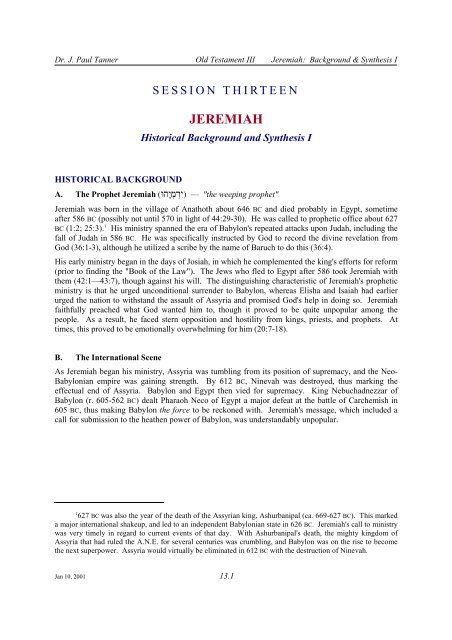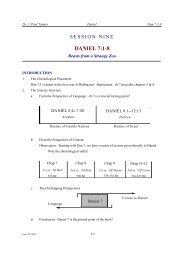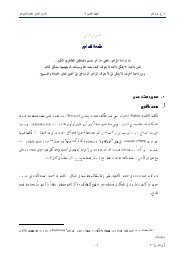Sess13-Jerem Back-Syn1.pdf - J. Paul Tanner
Sess13-Jerem Back-Syn1.pdf - J. Paul Tanner
Sess13-Jerem Back-Syn1.pdf - J. Paul Tanner
You also want an ePaper? Increase the reach of your titles
YUMPU automatically turns print PDFs into web optimized ePapers that Google loves.
Dr. J. <strong>Paul</strong> <strong>Tanner</strong> Old Testament III <strong>Jerem</strong>iah: <strong>Back</strong>ground & Synthesis I<br />
HISTORICAL BACKGROUND<br />
S E S S I O N T H I R T E E N<br />
JEREMIAH<br />
Historical <strong>Back</strong>ground and Synthesis I<br />
A. The Prophet <strong>Jerem</strong>iah ( ) — "the weeping prophet"<br />
<strong>Jerem</strong>iah was born in the village of Anathoth about 646 BC and died probably in Egypt, sometime<br />
after 586 BC (possibly not until 570 in light of 44:29-30). He was called to prophetic office about 627<br />
BC (1:2; 25:3). 1 His ministry spanned the era of Babylon's repeated attacks upon Judah, including the<br />
fall of Judah in 586 BC. He was specifically instructed by God to record the divine revelation from<br />
God (36:1-3), although he utilized a scribe by the name of Baruch to do this (36:4).<br />
His early ministry began in the days of Josiah, in which he complemented the king's efforts for reform<br />
(prior to finding the "Book of the Law"). The Jews who fled to Egypt after 586 took <strong>Jerem</strong>iah with<br />
them (42:1—43:7), though against his will. The distinguishing characteristic of <strong>Jerem</strong>iah's prophetic<br />
ministry is that he urged unconditional surrender to Babylon, whereas Elisha and Isaiah had earlier<br />
urged the nation to withstand the assault of Assyria and promised God's help in doing so. <strong>Jerem</strong>iah<br />
faithfully preached what God wanted him to, though it proved to be quite unpopular among the<br />
people. As a result, he faced stern opposition and hostility from kings, priests, and prophets. At<br />
times, this proved to be emotionally overwhelming for him (20:7-18).<br />
B. The International Scene<br />
As <strong>Jerem</strong>iah began his ministry, Assyria was tumbling from its position of supremacy, and the Neo-<br />
Babylonian empire was gaining strength. By 612 BC, Ninevah was destroyed, thus marking the<br />
effectual end of Assyria. Babylon and Egypt then vied for supremacy. King Nebuchadnezzar of<br />
Babylon (r. 605-562 BC) dealt Pharaoh Neco of Egypt a major defeat at the battle of Carchemish in<br />
605 BC, thus making Babylon the force to be reckoned with. <strong>Jerem</strong>iah's message, which included a<br />
call for submission to the heathen power of Babylon, was understandably unpopular.<br />
1 627 BC was also the year of the death of the Assyrian king, Ashurbanipal (ca. 669-627 BC). This marked<br />
a major international shakeup, and led to an independent Babylonian state in 626 BC. <strong>Jerem</strong>iah's call to ministry<br />
was very timely in regard to current events of that day. With Ashurbanipal's death, the mighty kingdom of<br />
Assyria that had ruled the A.N.E. for several centuries was crumbling, and Babylon was on the rise to become<br />
the next superpower. Assyria would virtually be eliminated in 612 BC with the destruction of Ninevah.<br />
Jan 10, 2001 13.1
Dr. J. <strong>Paul</strong> <strong>Tanner</strong> Old Testament III <strong>Jerem</strong>iah: <strong>Back</strong>ground & Synthesis I<br />
C. Important Dates Regarding Judah<br />
1. 641/640-609 - Josiah's reign<br />
627 - <strong>Jerem</strong>iah's call to ministry<br />
612 - Fall of Ninevah<br />
609 - Death of Josiah at Megiddo (by Egypt)<br />
2. 609 - Jehoahaz (Shallum) [3 months: Jul-Oct 609]<br />
3. 609-598 - Johoiakim's reign<br />
605 - Battle of Carchemish: Defeat of Pharaoh Neco by<br />
Nebuchadnezzar<br />
605 - First siege of Jerusalem by Nebuchadnezzar (small deportation<br />
to Babylon which included Daniel)<br />
4. 597 - Jehoiachin's reign (also called Jeconiah or Coniah) [3 months]<br />
597 - 2nd siege of Jerusalem by Nebuchadnezzar (another deportation<br />
which included Jehoiachin & Ezekiel)<br />
5. 597-586 - Zedekiah's reign<br />
588 - Zedekiah conspired with Pharaoh Hophra of Egypt against<br />
Nebuchadnezzar<br />
588 - Nebuchadnezzar laid siege to Jerusalem (lasting 30 months)<br />
586 - Jerusalem and the Temple destroyed<br />
6. 586 - Gedaliah appointed as governor over Judah<br />
STRUCTURE AND PURPOSE OF THE BOOK<br />
Jan 10, 2001 13.2<br />
Fixed his residence at Mizpah, 11 km. NW of Jerusalem, and<br />
was joined by <strong>Jerem</strong>iah (40:6).<br />
Structure - See chart on <strong>Jerem</strong>iah (Supplement to this session)<br />
Purpose - To record the tragic destruction of Jerusalem in 586 BC as a result of<br />
covenant unfaithfulness and in light of the rejection of YHWH's warnings,<br />
thus announcing a new covenant to be made with Israel in the future.<br />
In the future, God will restore and reunite both the Northern and Southern kingdoms as the New<br />
Covenant is effected. Then, the corrupt leadership of the nation (unjust kings, unrighteous priests and<br />
lying prophets) will be replaced by the righteous Davidic king, the Messiah.<br />
THE DEVELOPMENT OF THE BOOK<br />
The first major section of the book consists of chapters 1—20 in which Yahweh makes clear His<br />
contention with the Southern Kingdom of Judah. It had been roughly a hundred years since the<br />
Northern Kingdom was disciplined by exile. <strong>Jerem</strong>iah is called upon to be the primary prophet for the<br />
time of the Southern Kingdom's discipline by exile.
Dr. J. <strong>Paul</strong> <strong>Tanner</strong> Old Testament III <strong>Jerem</strong>iah: <strong>Back</strong>ground & Synthesis I<br />
A. <strong>Jerem</strong>iah's Commission (Ch 1)<br />
"the boiling pot facing away from the north" (1:13-15) - anticipates the Babylonian invasion<br />
from the north.<br />
B. Warnings in Light of Josiah's Reform Efforts (Ch 2–6)<br />
1. 2:3 – Israel was the first nation to worship the true God. Echoes the promise to Abraham<br />
(Gen 12:1-3).<br />
2. 2:18-19 – Commentary on the vain attempts at military alliances. Ironically, Judah will<br />
be disciplined by Egypt (2:36), an event which happened in 609 BC.<br />
3. 2:22-23 – Reform attempts are only superficial (cf. 3:1; 5:1-3; 6:16-21). Yet, they claim<br />
innocence (2:35). In reality, spiritual adultery was still active, as the people continued to<br />
turn to idolatry. Chisholm notes,<br />
<strong>Jerem</strong>iah specified certain pagan deities and practices as being especially attractive<br />
to the people. They worshiped the Canaanite storm and fertility god Baal (2:8, 23;<br />
7:9; 9:14; 11:13, 17; 12:16; 19:5; 23:13, 27; 32:29, 35) and even burned their<br />
children in the fire as whole offerings to this god (19:5) and to Molech (32:35; cf.<br />
Lev. 18:21; 20:2-5; 2 Kings 23:10). They also expressed their devotion to the<br />
Mesopotamian goddess Ishtar, called in <strong>Jerem</strong>iah "the Queen of Heaven" (7:18;<br />
44:17-19, 25). The worship of this goddess involved the ritual of baking cakes in<br />
her image, burning incense, and pouring out drink offerings. Following the<br />
destruction of Jerusalem, the exiles in Egypt even resumed this practice, claiming<br />
that the city's downfall was the result of abandoning the ritual (44:15-19). 2<br />
4. Social injustice, evidenced by oppression of the poor and failure to defend the course of<br />
widows and orphans, characterized society (2:34; 5:26-28; 7:5-6).<br />
5. 2:30 – The nation has not been responsive to God's chastening (cf. 5:2-3; 6:10,16).<br />
6. 3:6-10 – Judah has failed to learn from Samaria's downfall. In contrast, she has mocked<br />
the danger of judgment (5:11-13), often putting vain hopes in the messages of the false<br />
prophets (5:12; 8:11; 14:13,15; 27:9; 28:2-4).<br />
7. Israel's millennial blessings (3:14b-18) are conditioned on true repentance (3:11-14a).<br />
This is in keeping with the principle of restoration laid down in Deut 30.<br />
8. Judgment is imminent (foreign invasion—4:5-9; 5:15; 6:22), yet repentance is still urged<br />
to avert judgment (4:1-4,14).<br />
C. <strong>Jerem</strong>iah's Temple Address (Ch 7–10)<br />
1. 7:2 – The setting for this section is at the Temple of the LORD.<br />
2. 7:3-11 – The people are rebuked for hollow worship at the Temple.<br />
3. This material does not necessarily represent a single occasion. This should be<br />
coordinated with 26:1-2 which places the scene in the early part of Jehoiakim's reign (ca.<br />
609-605 BC). Whereas chapter 7 emphasizes the event itself and <strong>Jerem</strong>iah's boldness,<br />
chapter 26 records the consequences of the address.<br />
2 Robert B. Chisholm, Jr., "A Theology of <strong>Jerem</strong>iah and Lamentations," A Biblical Theology of the Old<br />
Testament, 343.<br />
Jan 10, 2001 13.3
Dr. J. <strong>Paul</strong> <strong>Tanner</strong> Old Testament III <strong>Jerem</strong>iah: <strong>Back</strong>ground & Synthesis I<br />
4. 8:8 – superficial righteousness! The LORD desired true righteousness of heart (9:23-24).<br />
5. The heart of this address: unless Judah repented, Jerusalem would be as Shiloh (7:12; cf.<br />
26:4-6).<br />
D. Call for Covenant Faithfulness (Ch 11–12)<br />
1. No date is given for this unit, and the historical setting is debated.<br />
2. Feinberg comments, "Some, recognizing that <strong>Jerem</strong>iah is condemning Judah for<br />
disobeying the law of Moses, hold that the time must be in Jehoiakim's reign, when there<br />
was a retrogression from the reformation in Josiah's reign. Others hold, and their view<br />
represents a consensus of expositors, that the historical setting was the reign of Josiah<br />
with his reformation, which proved to be only superficial. This position is preferable.<br />
The date might even have been soon after the discovery of the Book of the Law before<br />
the reform became widespread (v. 6; cf. 2 Kings 23)." 3<br />
3. Several verses hint that this probably followed the discovery of the Book of the Law<br />
(11:2,6). 11:6 could be looking at Josiah's proclamation of the Law and his call for<br />
reforms.<br />
E. Signs to Awaken Repentance (Ch 13–19)<br />
These chapters utilize several vivid object lessons designed to awaken Judah to repentance.<br />
This includes the linen waistband (13:1), a drought (14:1), <strong>Jerem</strong>iah's celibacy (16:2), the<br />
potter's wheel and clay (18:1), and the broken jar (19:1). Chisholm explains the significance of<br />
these in light of the historical context:<br />
To illustrate the coming judgment, the Lord gave the people vivid object lessons. He<br />
instructed <strong>Jerem</strong>iah to refrain from taking a wife, mourning over the dead, or<br />
participating in feasts (16:1-9). <strong>Jerem</strong>iah's celibate lifestyle foreshadowed the decimation<br />
of the nation's families. The sword and famine would rob families of husbands/fathers,<br />
wives/mothers, and children. The prophet's refusal to participate in funerals anticipated<br />
the day when people would not have time or opportunity to bury their dead, let alone<br />
formally lament over them. Feasting was inappropriate, for God's judgment would soon<br />
bring an end to all the land's joyous celebrations. 4<br />
1. Judah's need was to cling to the LORD (13:11). This is the same Hebrew word used in<br />
Gen 2 for the man and woman clinging to each other.<br />
2. Notice the prevalence of those in the nation who are deceived into thinking that they are<br />
prophesying for the LORD (14:13-14).<br />
3. 15:4 – The evil of Manasseh is a primary factor that sealed the fate of the Southern<br />
Kingdom of Judah.<br />
4. 17:5-10 – Observe God's evaluation of humanism.<br />
5. 20:7-11 – Observe <strong>Jerem</strong>iah's personal struggle in the ministry.<br />
F. <strong>Jerem</strong>iah Confronted Followed by Emotional Turmoil (Ch 20).<br />
3 Charles L. Feinberg, <strong>Jerem</strong>iah, The Expositor's Bible Commentary, Vol. 6 (Grand Rapids, MI:<br />
Zondervan Pub. House, 1986), 95-96.<br />
4 Chisholm, 351.<br />
Jan 10, 2001 13.4
Dr. J. <strong>Paul</strong> <strong>Tanner</strong> Old Testament III <strong>Jerem</strong>iah: <strong>Back</strong>ground & Synthesis I<br />
A LESSON FOR OUR LIFE<br />
As with ancient Judah, the LORD detests superficial obedience—outward religious expressions when<br />
the heart is elsewhere. He is far more concerned about what goes on at the level of the heart (17:9-<br />
10). One of the struggles that all God's people face in the ministry is the tension between learning<br />
and yearning. There are many things that we all need to learn in preparation for our ministry, but this<br />
must never come at the expense of yearning for fellowship with our wonderful Lord, Himself. Our<br />
heart can easily be deceived into thinking that we are "spiritual" when in actuality we are drifting<br />
from the heart of our Lord. What a pitiful state the servant of God has fallen into who does not wake<br />
up in the morning and yearn to get alone with His God and fellowship with Him in prayer and the<br />
study of His precious Holy Word. Cultivate this now, or face a bleak future of unfruitful ministry<br />
from a dry heart! Let us then be careful, lest we assume our heart cannot be deceitful. God must be<br />
allowed to sensitize our heart with His own.<br />
Jan 10, 2001 13.5




